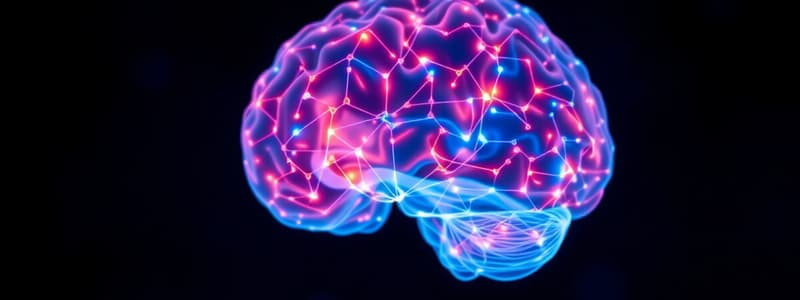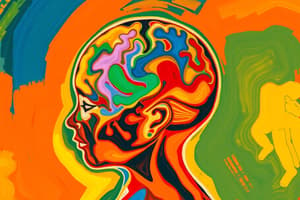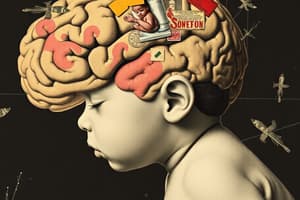Podcast
Questions and Answers
What factor influenced the infants' persistence in trying to make the toy play music?
What factor influenced the infants' persistence in trying to make the toy play music?
- The age of the infants
- How long they observed the adult's effort (correct)
- The music played by the toy
- The color of the toy
What is the primary focus of Piaget's theory during the first two years of life?
What is the primary focus of Piaget's theory during the first two years of life?
- Social interactions
- Emotional development
- Sensorimotor intelligence (correct)
- Visual perception
Which of the following best describes Stage One of Piaget’s sensorimotor stages?
Which of the following best describes Stage One of Piaget’s sensorimotor stages?
- Deliberate interactions with the environment
- Reflexive responses (correct)
- Making interesting sights last
- Coordinating reflexes with actions
What characterizes Stage Four of Piaget's sensorimotor development?
What characterizes Stage Four of Piaget's sensorimotor development?
What is gaze-following in infants primarily associated with?
What is gaze-following in infants primarily associated with?
Which behavior is typical of children in Stage Three of sensorimotor development?
Which behavior is typical of children in Stage Three of sensorimotor development?
What does longer staring at the dinosaur instead of the flower suggest about infants?
What does longer staring at the dinosaur instead of the flower suggest about infants?
What is the key behavioral characteristic of infants in Stage Five of Piaget's theory?
What is the key behavioral characteristic of infants in Stage Five of Piaget's theory?
What change occurs in Step Six of Piaget’s theory?
What change occurs in Step Six of Piaget’s theory?
What type of memory emerges later in infants, usually dependent on language?
What type of memory emerges later in infants, usually dependent on language?
What was a significant finding from the study mentioned regarding infant behavior?
What was a significant finding from the study mentioned regarding infant behavior?
Which area of the brain is primarily associated with implicit memory in infants?
Which area of the brain is primarily associated with implicit memory in infants?
How do infants demonstrate implicit memory according to research?
How do infants demonstrate implicit memory according to research?
Under Piaget's framework, secondary circular reactions primarily focus on what aspect of infant development?
Under Piaget's framework, secondary circular reactions primarily focus on what aspect of infant development?
How does the idea that hard work pays off relate to cognitive development in infants?
How does the idea that hard work pays off relate to cognitive development in infants?
What was observed when a reminder session was introduced for infants who learned to kick?
What was observed when a reminder session was introduced for infants who learned to kick?
What typically happens to explicit memory as children grow?
What typically happens to explicit memory as children grow?
What behavior do infants exhibit when they encounter unexpected changes in their environment?
What behavior do infants exhibit when they encounter unexpected changes in their environment?
As infants grow, what ability regarding learning is primarily influenced by their experiences?
As infants grow, what ability regarding learning is primarily influenced by their experiences?
What factor influences the distinction between implicit and explicit memory in infants?
What factor influences the distinction between implicit and explicit memory in infants?
What suggests that infants have a motive to acquire information from an early age?
What suggests that infants have a motive to acquire information from an early age?
How do infants demonstrate their eagerness to explore the world?
How do infants demonstrate their eagerness to explore the world?
What role do caregivers play in an infant's learning process?
What role do caregivers play in an infant's learning process?
What was the initial reaction of some scientists to the idea of infants as 'scientists in the crib'?
What was the initial reaction of some scientists to the idea of infants as 'scientists in the crib'?
What notable behavior do infants exhibit when observing adults?
What notable behavior do infants exhibit when observing adults?
What is one feature of the developmental neuroscience field in relation to infants?
What is one feature of the developmental neuroscience field in relation to infants?
What is a possible reason infants engage in gaze-following?
What is a possible reason infants engage in gaze-following?
How do dogs typically respond to babies, according to the content?
How do dogs typically respond to babies, according to the content?
What does the concept of infants as 'scientists in the crib' imply?
What does the concept of infants as 'scientists in the crib' imply?
Which statement about the infant brain is true?
Which statement about the infant brain is true?
Flashcards are hidden until you start studying
Study Notes
The Eager Mind
- Infants leverage all senses to connect with people and explore their environment.
- Infants are described as “scientists in the crib,” indicating a natural curiosity and inclination to learn.
- Advances in developmental neuroscience have unveiled how the infant brain is primed for learning.
- Infants exhibit perceptual biases and attention patterns that indicate a strong purpose to gather information.
Gaze-Following
- Infants instinctively follow caregivers' gazes, enhancing their understanding of the world.
- Gaze-following occurs even without explicit cues from adults, showcasing an innate skill.
- Infants look towards what adults observe, suggesting that this behavior is both learned and natural.
Early Logic
- Infants demonstrate an understanding of basic concepts in math and science.
- Research shows infants react with longer looks when items that should be present are replaced with unexpected objects, indicating surprise and a grasp of physical laws.
- Developmentalists propose that infants possess some form of inherent logic, challenging the notion that scientific reasoning is solely developed later in life.
Infant Memory
- Memory is crucial for knowledge acquisition in infancy, encompassing both implicit and explicit forms.
- Implicit memory develops early and influences lifelong responses, while explicit memory requires language and improves throughout childhood.
- Experiments reveal that infants retain implicit memories of actions like moving a mobile, even after a delay.
Learning Strategies
- Infants learn how to learn through experiences; some become more cautious while others remain curious.
- Observational learning affects persistence; infants who watch adults struggle are more likely to keep trying with new toys compared to those who see quick success.
- Early persistence and exploration behaviors establish foundational learning strategies vital for education later in life.
Piaget’s Sensorimotor Intelligence
-
Jean Piaget’s work laid the groundwork for understanding infant cognition, emphasizing the role of sensory and motor skills.
-
Piaget categorized cognitive development in infants into six stages, framed around circular reactions where experiences feed into one another.
-
Primary Circular Reactions:
- Stage One (birth to 1 month): Reflexive actions like sucking and grasping.
- Stage Two (1–4 months): First adaptations and the coordination of reflexes.
-
Secondary Circular Reactions:
- Stage Three (4–8 months): Enhancing interactions with people and objects.
- Stage Four (8–12 months): Deliberate responses; infants plan actions to engage others.
-
Tertiary Circular Reactions:
- Stage Five (12–18 months): Active experimentation and problem-solving.
- Stage Six (18–24 months): Mental combinations; infants anticipate outcomes based on past experiences.
Studying That Suits You
Use AI to generate personalized quizzes and flashcards to suit your learning preferences.




